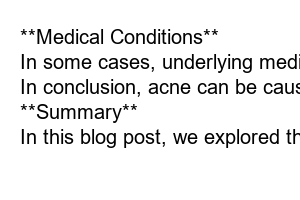다래끼 나는 이유
Acne, the bane of many people’s existence, can be frustrating and embarrassing. But have you ever wondered why you get acne in the first place? In this blog post, we’ll explore the various factors that contribute to acne breakouts and provide some tips on how to manage this common skin condition.
**What is Acne?**
Acne is a skin condition that occurs when hair follicles become clogged with oil and dead skin cells. This results in the formation of pimples, blackheads, and whiteheads on the skin.
**Hormonal Changes**
One of the most common reasons for acne breakouts is hormonal changes, particularly during puberty. The increase in hormones, such as testosterone, can lead to an overproduction of oil in the skin, causing pores to become clogged and acne to develop.
**Genetics**
If your parents had acne, there’s a good chance you might too. Genetics play a role in determining your skin type and how prone you are to developing acne.
**Diet and Lifestyle**
What you eat and how you live can also impact your skin. A diet high in sugar and processed foods can trigger inflammation in the body, leading to acne breakouts. Stress and lack of sleep can also worsen acne symptoms.
**Skincare Habits**
Using harsh skincare products or not properly cleansing your face can aggravate acne. It’s important to use gentle, non-comedogenic products and establish a consistent skincare routine to keep acne at bay.
**Environmental Factors**
Pollution, humidity, and other environmental factors can contribute to clogged pores and acne breakouts. It’s important to protect your skin from these external aggressors by cleansing regularly and using sunscreen.
**Medical Conditions**
In some cases, underlying medical conditions such as polycystic ovarian syndrome (PCOS) or hormonal imbalances can lead to acne. If you suspect a medical issue might be causing your acne, it’s best to consult with a healthcare professional.
In conclusion, acne can be caused by a combination of factors such as hormonal changes, genetics, diet, lifestyle, skincare habits, environmental factors, and medical conditions. By understanding these triggers and taking steps to address them, you can effectively manage and reduce acne breakouts for clearer, healthier skin.
**Summary**
In this blog post, we explored the various reasons why people get acne, including hormonal changes, genetics, diet, lifestyle, skincare habits, environmental factors, and medical conditions. By identifying these triggers and making changes to address them, you can help prevent and manage acne breakouts effectively.

